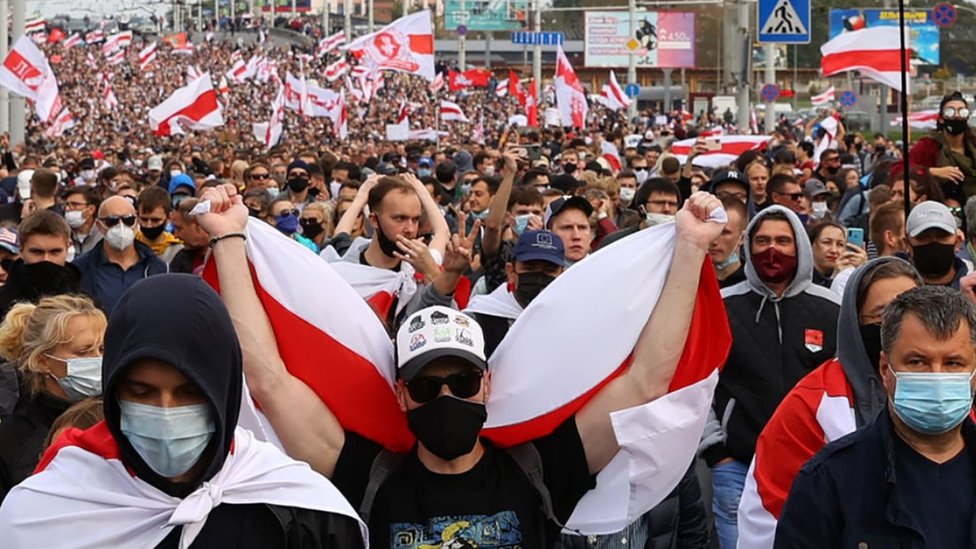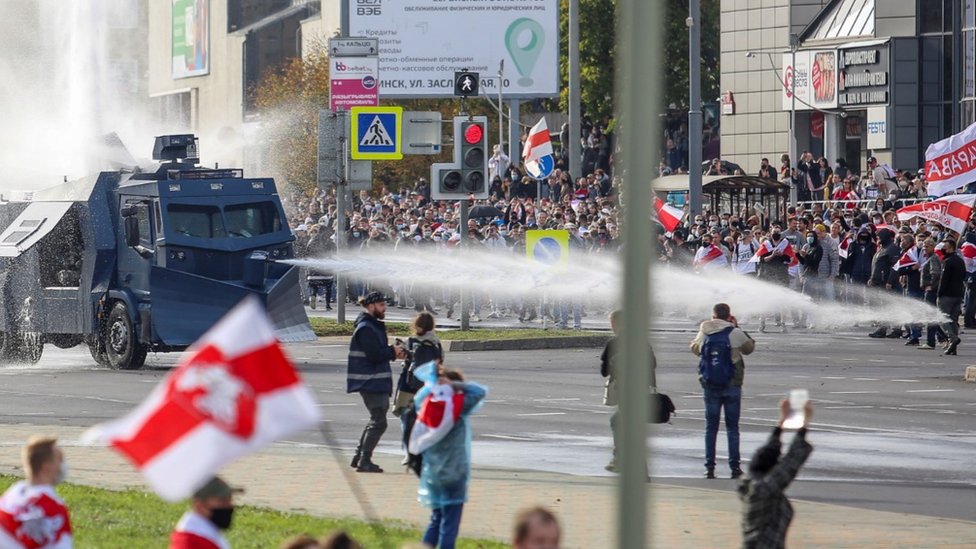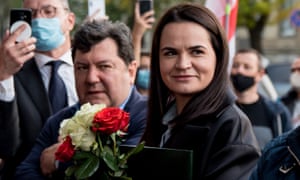Sanctioning Belorusian President Alexander Lukashenko
"Canada will not stand by silently as the government of Belarus continues to commit systematic human rights violations and shows no indication of being genuinely committed to finding a negotiated solution with opposition groups.""Canada and the United Kingdom are acting together to ensure these sanctions have a greater impact and to demonstrate unity in our condemnation of the situation."Canadian Foreign Affairs Minister Francois-Philppe Champagne"Today the U.K. and Canada have sent a clear message by imposing sanctions against Alexander Lukashenko's violent and fraudulent regime. We don't accept the results of this rigged election.""We will hold those responsible for the thuggery deployed against the Belarusian people to account and we will stand up for our values of democracy and human rights."British Foreign Secretary Dominic Raab
 |
| Huge crowds rally in Minsk every Sunday despite a heavy police presence Getty Images |
 |
| Officers used water cannons against the crowds in Minsk Reuters |
Directly following the August 9 presidential election, mass protests have marked the people's preference that Lukashenko, who has ruled for 26 years, step down. Somehow, the electorate failed to be convinced on the evidence presented that they had voted 80 percent for the man who has ruled the nation with an iron fist. The government's response to the protests has failed to persuade critics of the vote and the candidate they hoped to see the last of, to stop coming out in droves to express their anger and disgust. And Sundays continue to host the largest of the rallies.
Svetlana Tikhanovskaya was evidently so unpopular, mounted so lacklustre a challenge, that she received a mere ten percent of the presidential vote. The manipulated vote count sparked the protests that were to follow when in the initial days following the vote, Lukashenko sought to regain control by brutal crackdowns, police detaining thousands of protestors, injuring many people with the use of truncheons, rubber bullets and stun grenades, the obvious sign of a benevolent dictator. That level of violence has since been reduced, while scores of protestors continue to be arrested, their leaders prosecuted.
 |
| Lukashenko is shown delivering a speech during his inauguration ceremony at the Palace of the Independence in Minsk on Sept. 23. The authoritarian leader assumed his sixth term of office in August. (Maxim Guchek, BelTA/Pool Photo via The Associated Press) |
Neighbouring Ukraine has taken its own measures to support the protest movement in Belarus, with Ukrainian President Volodymyr Zelenskiy signing a new decree ordering his government to extend temporary stays for IT specialists from Belarus and their families to 180 from the current 90 days, and to grant residence permits for them within three days. Authorities are ordered to ease the issuance of work permits and taxpayer registration in a move to simplify regulations for Belarusian IT workers willing to relocate to Ukraine.
While the Belarus standoff continues -- reflecting its geopolitical dimension with Russia on one side, the West on the other, Svetlana Tikhanovskaya, the Belarusian opposition leader, plans to meet with Angela Merkel in Berlin to ask the German chancellor regarding "her potential participation as a mediator" in proposed talks between the government of autocrat Alexander Lukashenko and the protest leaders. Mr. Lukashenko has refused outright to take part in potential negotiations, bolstered by the unconditional support of Vladimir Putin.
 |
| Svetlana Tikhanovskaya Photo: Arturas Morozovas/Getty Images |
"We will discuss ways to put pressure on Belarus, because Belarusians think that only with pressure can we force the authorities into dialogue with the people", she explained from her office in Vilnius where she has been based since being forced to flee Belarus following threats expressed during a conversation with officials the day following the disputed election, when Lukashenko won his sixth term as president-for-life. "The Belarusian people already consider Lukashenko to be illegitimate. When we say negotiations with the government, we are talking about people lower down; some people should take responsibility and start these negotiations to find a way out of the crisis."
Labels: Belarus, Canada, E.U, Protests, Russia, Sanctions, U.K.
0 Comments:
Post a Comment
<< Home